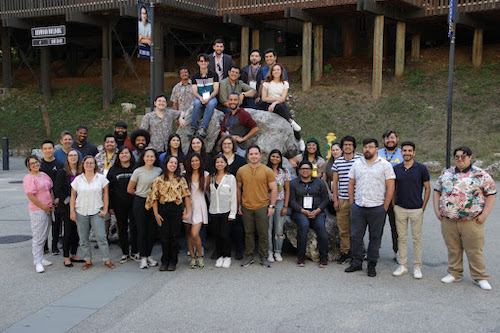Campus News
Cal-Bridge awarded $4 million to diversify STEM
The Cal-Bridge program, which supports students from historically underserved backgrounds in STEM, was recently awarded $4 million in the 2023-2024 California state budget. The funding will provide scholarships, mentorship and professional development opportunities for undergraduate and graduate students around the state in physics and astronomy, computer science, and math.

The Cal-Bridge program, which supports students from historically underserved backgrounds in STEM, was recently awarded $4 million in the 2023-2024 California state budget. The funding will provide scholarships, mentorship and professional development opportunities for undergraduate and graduate students around the state in physics and astronomy, computer science, and math.
“At the University of California and California State University, we’re working together to grow our own researchers and faculty members who reflect our state’s diversity and innovative perspective,” said UC Santa Cruz Campus Provost and Executive Vice Chancellor Lori Kletzer. “The value of the Cal-Bridge program is being seen across the Golden State, building a solid pathway and supporting scholars from their CSU undergraduate studies through their PhDs at the University of California and elsewhere and into their careers.”
Cal-Bridge was founded in 2014 at Cal Poly Pomona as a program for undergraduate students from underserved backgrounds. It has now expanded to nine University of California campuses, all 23 California State University campuses, and 116 California public community colleges. The program has supported almost 300 underrepresented scholars since it began. This fall, 66 new students will join the tenth cohort: 38 physics and astronomy scholars, 18 computer science scholars and 10 math scholars.
Bruce Schumm, a distinguished professor of physics at the University of California, Santa Cruz, serves as the founding director of the doctoral program for Cal-Bridge. He says the new state funding has changed the way the program leaders think about the future of Cal-Bridge, which was originally an NSF-funded program.
“We feel that we can be much more expansive now in our vision and in expanding and projecting ourselves forward,” said Schumm. He added that the program has California state Senator John Laird to thank for spearheading the effort to obtain the funding this year.
“He set the tenor by putting in a five-year, $68 million budget item as a way to get the conversation started,” said Schumm. “Without that, we might well have ended up with zero this year. Instead we received $4 million in a difficult budget year.”
Senator Laird shared his view of the program in a recent press release:
“Cal-Bridge is a transformational program that creates a pathway for its scholars to achieve an advanced degree while unlocking opportunities to engage with seasoned professionals and embark on fruitful careers in the STEM field. I am proud to support funding for Cal-Bridge and eagerly anticipate seeing its success for our underserved Californians. By dismantling barriers and fostering inclusivity, we can equip the next generation with the tools and resources needed to thrive in our great state.”
With the new state funding, the Cal-Bridge undergraduate scholars will receive scholarships, mentorship, summer research opportunities and guidance surrounding graduate school applications. Doctoral scholars in the program will receive $40,000 in support to be used in whatever ways best support their education. The doctoral scholars program also focuses on mentorship surrounding pedagogical practices and research leadership. Doctoral scholars came together in July to learn about and discuss those topics at the first Cal-Bridge Summer Institute, hosted by UC Santa Cruz.
“There are a lot of programs that are designed to help graduate students try to get their minds around pedagogy, but this is the only one I know of where research leadership is also part of the professional development,” said Schumm. Cal-Bridge is working with a consultancy nonprofit based in the UK which focuses on developing research leaders.
By supporting historically underserved scholars from the undergraduate level all the way through doctoral research and applications to STEM faculty positions, Cal-Bridge aims to make the higher education demographic better represent the population of California.
“Cal-Bridge represents a comprehensive approach by supporting diverse talent throughout the entire pathway from undergraduate STEM through their doctorate and into the workforce,” said Cal-Bridge Executive Director Alexander Rudolph.